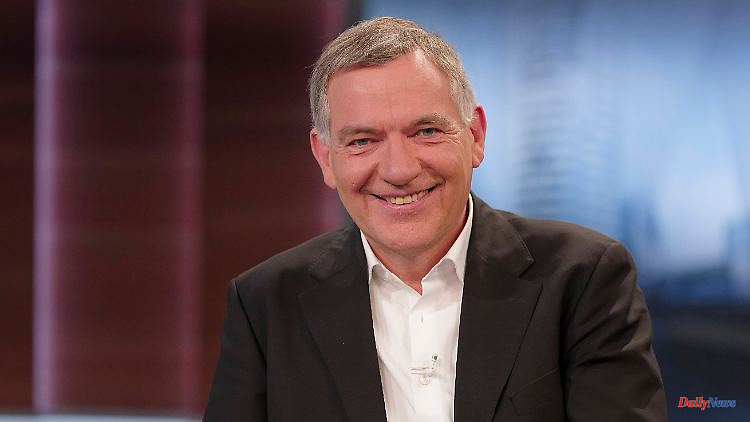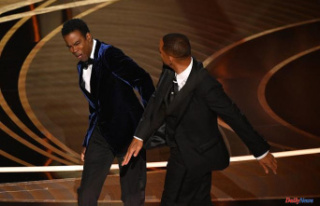As Russia's war in Ukraine rages on, voices for diplomacy are raised in Germany. But is it possible to negotiate with Vladimir Putin? At "Anne Will" the guests argue about Olaf Scholz, the choice between weapons and mediation - and Chinese soldiers in Ukraine.
A year ago, Russia launched an attack on Ukraine. Since February 2022, people have been fighting back against the Russian invasion, also thanks to arms deliveries from Germany. An end to the war is still not in sight and Federal Chancellor Olaf Scholz declares that one cannot create peace by stopping arms deliveries. In Germany, however, a majority says diplomatic efforts have not gone far enough. And so the ARD talk show "Anne Will" asked on Sunday evening whether "peace negotiations with Vladimir Putin are currently possible".
No, is the simple answer to which all those discussing agree. However, if you delete the word "currently", things get trickier - especially with regard to the question of what negotiations and security guarantees might look like. "You can't negotiate with a gun at your temple," Scholz continued in his government statement on Thursday. A sentence that, according to talk show host Anne Will, "could fit into a crime scene", but which refers to "terrible reality". For Jan van Aken, however, it is "complete nonsense". After all, every peace negotiation would be conducted "that's how war is."
Right at the beginning of the discussion, the left-wing politician explained: "Deliveries of arms do nothing at all to bring the war to a quick end." You have to put pressure on Russia differently. Van Aken admits that Putin "will not be swept away," but he still wants "to change something politically in the Kremlin" and, for example, "actively bring China or Brazil to the table with offers." Scholz didn't do that once, as van Aken confirmed several times before adding, with a view to the Chancellor's attitude to arms deliveries: "You don't have to believe everything Olaf Scholz says."
Such statements drive Kevin Kühnert more and more upset the longer the show lasts. "Without weapons, Ukraine would have been over," countered the SPD general secretary. There is only a defensive Ukraine left because it was able to defend itself - even if that was "not an appeal for permanent rearmament". In addition, it is currently not known at all whether arms deliveries might have brought Ukraine closer to peace, says Kühnert. Only the future will tell. And of course Scholz spoke to China and even had to take a lot of criticism during his visit. All in all, the SPD politician believes that one should be content with the fact that the peace negotiations, if they do take place, "will not take place on TV" but "in quiet, diplomatic channels".
China remains a big topic on the show. Van Aken is keen to get the autocratic regime "on board" because "China has no interest in the war and wants it to end." As security guarantees for Ukraine, he proposes a UN mandate for currently occupied territories, at the end of which there should be referendums. Christoph Heusgen is now annoyed about this. This plan already existed in Donbass before the 2022 invasion, according to the chairman of the Munich Security Conference. But it didn't work because "Putin didn't accept a ceasefire, didn't withdraw his heavy weapons and didn't give the OSCE (Organization for Security and Co-operation in Europe; ed.) freedom of movement." Even after the annexation of Crimea, such negotiations with Russia, which van Aken proposes, have led to nothing "for years" and Germany now has the "moral obligation" to continue to deliver weapons, "even if that is a turning point".
However, Van Aken conjured another idea out of a hat during the panel discussion: Chinese soldiers should implement the blue helmet missions in the occupied territories. Because: "Putin will never dare to shoot at a Chinese." Heusgen even agrees that something like this could "of course be considered," but he recalls that Beijing abstained on the UN Security Council resolution against Russia. However, the left-wing politician finds this "good" because "that's the only way China can still act as a mediator."
The only Ukrainian in the group sadly shakes her head at this point. Lyudmyla Melnyk, a researcher at the Institute for European Politics, finds the idea of the UN mission "cynical, to say the least." None of the Ukrainian residents had ever wanted referendums there before the invasion of Russia and therefore this demand from the outside is now questionable. In addition, there is only "scorched earth, the people are no longer there" in the areas.
Melnyk then criticized the fact that negotiations were "presented as a panacea". As if "everything would be fine" with that. As if a signed paper would lead to "a change of heart" on the part of Putin. The scientist considers this to be dangerous and that it would be better to analyze the roots of the war. Putin has already shown his true colors in Georgia, Syria, Crimea and Donbass. According to Melnyk, the dramatic thing was "that it took so long to understand that we were dealing with a dictator".
Ukraine is now "not just about territories," says Melnyk, but about creating conditions "so that such aggression is never repeated. So that the next generation doesn't have to go to the front again." Ukraine's accession to NATO, which Secretary General Jens Stoltenberg recently announced as a "long-term" plan, would probably be the surest guarantee. But it won't come to that for many years, say Kühnert, Heusgen and van Aken in unison this time.
Serious diplomatic rapprochement between the two warring parties is likely to be almost as difficult in the near future. Because what no one noticed in the round of talks: A fundamental prerequisite for the chances of diplomatic negotiations only take place in times of war if all sides see an advantage for themselves in ending the hostilities. At the moment this is not the case either on the Russian side (Putin does not want to be seen as a loser and has not yet completed his plan of conquest) or on the Ukrainian side (several areas are still occupied by the enemy).
At the end of the show, talk show host Will would like to know from Melnyk how she thinks the war could be ended. "Russia must learn to lose," says the Ukrainian scientist.












